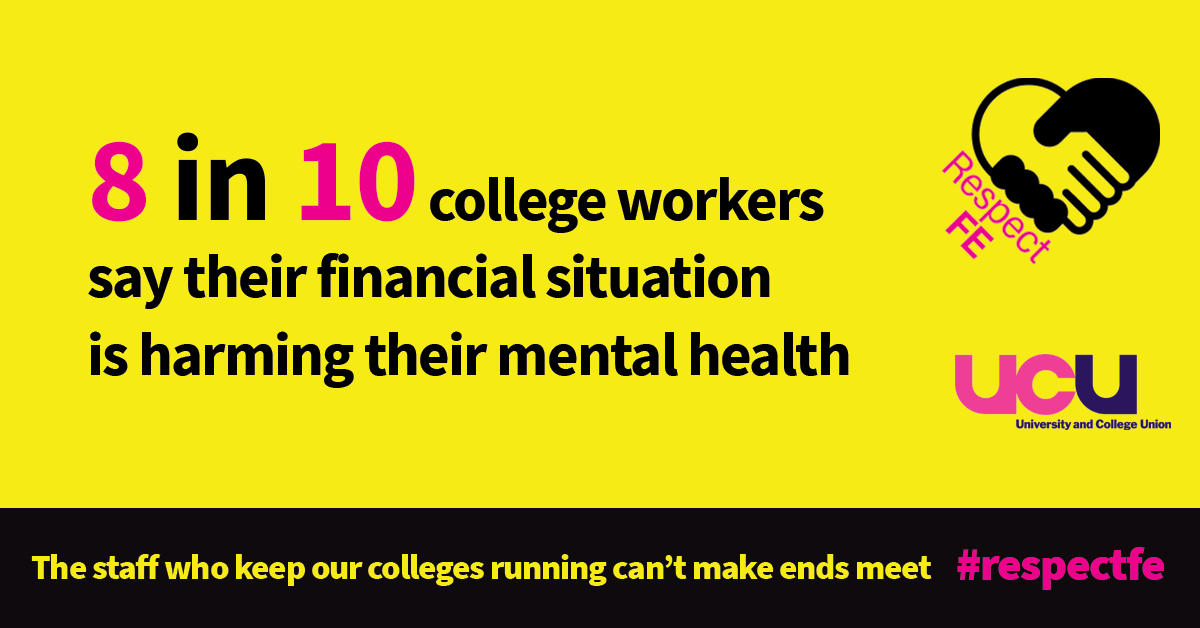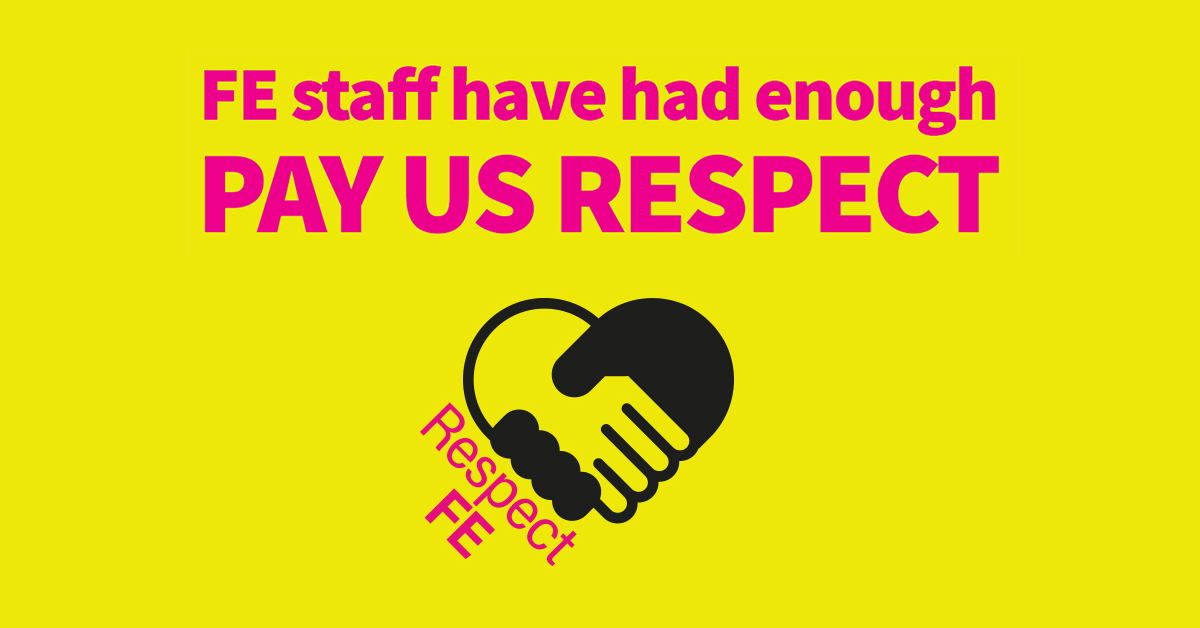
Eight in 10 staff in English colleges suffer from financial insecurity
8 July 2022
More than eight in 10 college workers in England say their financial situation is harming their mental health. The findings are from a UCU report 'On the breadline: The cost of living for England's college workers'.
The report, is based on a survey of over 2,700 workers from more than 200 colleges across England. Staff were asked the extent to which their financial security has changed over the past year and how rising costs and falling pay were impacting their welfare and their future within the sector.
The findings reveal a workforce in financial crisis, plagued by job insecurity and poor working conditions. The vast majority (80%) of staff are more financially insecure than they were a year ago and more than four in five (82%) say their lack of financial security is impacting their mental health. Due to their situation, seven in 10 say are considering leaving the sector unless pay is increased.
More than four in 10 (42%) said their income does not cover the cost of living. Of these, almost two thirds (64%) said they heat their home less frequently, two in five (40%) said they restrict hot water and a quarter (25%) said they are skipping meals.
UCU said it was 'beyond scandalous' that staff were being forced to take such extreme measures to make ends meet. The union is currently balloting over 30 colleges across England over low pay and is today threatening to extend strike ballots into more English colleges should employers refuse to act.
The Department for Education (DfE) has announced £1.6bn in extra funding for further education and UCU estimates that colleges already have an additional £400m that is available to spend on staff compared with 2019-20. Whilst the ministers responsible for education and levelling up quit government, UCU said that any remaining ambitions to 'level up' and 'supercharge' further education will be undeliverable if staff leave the sector because of low pay. UCU has sent the report along with letters to employer body Association of Colleges (AoC) and the DfE, which appointed its third secretary of state of the week yesterday.
Staff pay has now fallen 35% behind inflation since 2009 after a series of below inflation offers from employer body the Association of Colleges (AoC). In pay scales drawn up by the AoC, unqualified teachers can earn as little as £21,000 with qualified teachers starting on less than £26,000. Meanwhile, some college bosses earn over £200,000. In the latest round of negotiations, the AoC has offered just 2.5%, despite inflation hitting a 40 year high with the retail price index sitting at 11.7% and energy and food prices set to continue rising into 2023. UCU is calling for a 10% uplift to pay and for colleges to become Living Wage accredited employers so that every worker gets paid at least the living wage.
The report's main findings include:
- seven in 10 (70%) of the report's respondents said they would not be working in the sector in five years' time unless issues surrounding pay, workloads and job security are addressed
- four in five (80%) said they felt financially insecure or very financially insecure, compared to 12 months ago
- over 19 in 20 (96%) said that their income either does not cover their costs of living or only just about covers their cost of living.
- more than four in five respondents (82%) said their financial situation was having an impact on their mental health
- almost half of respondents (47%) said their financial situation has damaged or seriously damaged relationships with friends and family members
- of the 42% of respondents who said their income does not cover the cost of living, about two thirds (64%) said they heat their home less frequently, two in five (40%) said they restrict hot water and a quarter (25%) said they skip meals.
Comments from respondents:
'It has got to an untenable position where I can no longer stay in my current job as I can no longer afford to work there, even though I'm a full time teacher. I have exhausted all savings. I can't buy a house, as my salary doesn't cover me to get a mortgage for a single room flat let alone a house.'
'I enjoy my job but am considering moving into something less stressful that also offers greater pay - e.g. all supermarket work!'
'I haven't had the heating on since April because of the price hike and I don't cook meals that take over 20 mins to reduce costs.'
'As a single parent, I don't know how I will be able to cope when the second increase in energy bills come in October. I am in debt and it is affecting my mental health.'
'The cost of living increases are having such a major impact on my mental health that I've started taking anti-depressants.'
'I am literally living hand to mouth. I want to get out of teaching in further education.'
'I had to find a cleaning job that pays cash in hand to make ends meet. I am also on universal credit which helps towards the rent. But I can't afford to pay for childcare. So, I either pay for food or for childcare.'
Recommendations from the report
In their responses, staff in English colleges said that their top four priorities are higher pay, more manageable workloads, reduced admin work and better job security (p21).
Pay
To begin restoring staff pay after more than a decade of real term cuts the report recommends an immediate 10% increase in pay to support staff through the cost of living crisis, and stop a mass exodus of skilled staff leaving the sector over the next five years.
Workloads & job security
College staff work an average of two extra days unpaid every week due to sky high workloads and over half of staff are on some form of insecure contract. The report recommends that employers commit to working with UCU to increase job security and reduce workloads.
National bargaining
Meaningful national bargaining will help equalise pay across England's regions, but currently the AoC merely recommends pay awards to college employers. The report recommends that colleges agree to a binding national bargaining framework to ensure pay is levelled up across England.
UCU general secretary Jo Grady said:
'As the government falls apart, the college staff responsible for delivering what remains of its levelling up agenda are saying they cannot afford to stay in further education. With seven in ten pledging to leave their jobs if pay and working conditions continue to be eroded it is clear that the future of the entire sector is under threat.
'It is beyond scandalous that dedicated college staff are being forced to skip meals and ration hot water and heating because their low pay has left them completely exposed to this cost of living crisis. Employers who have driven down pay for over a decade should hang their heads in shame.
'Those who lead our colleges, often on very large salaries, need to consider how long they can continue to dine off the goodwill and dedication of college staff without properly rewarding them with decent pay, secure contracts and manageable workloads.
'A big injection of government funding means that English colleges are more than able to afford proper pay increases of at least 10%. The harrowing testimony of college staff should shock employers into action. If it doesn't and ministers refuse to step in, our union will ballot for strike action at even more English colleges, with the aim of delivering uplifts in pay which will enable college staff to make it through this cost of living crisis, and safeguard the future of the sector.'
- PrintPrint this page
- Share


